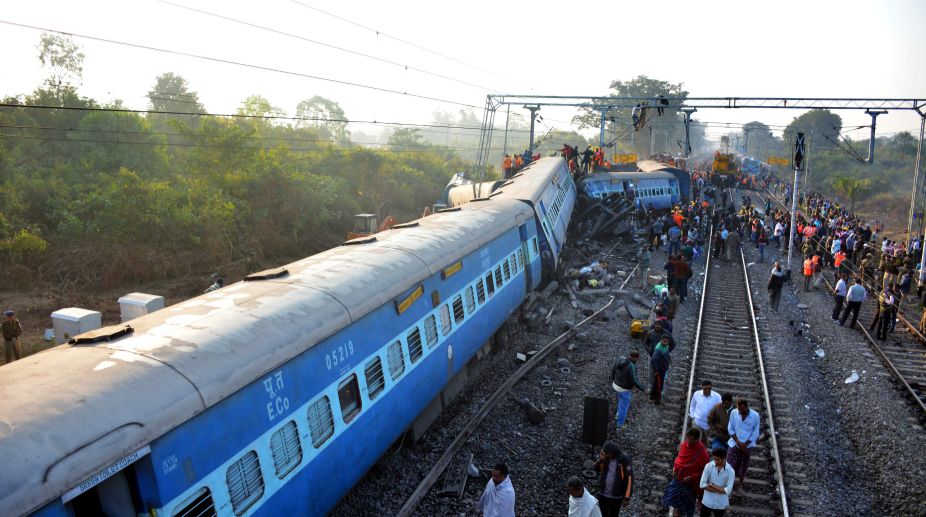As the government finally gets ready to give into the demand of allocation of separate railway safety funds in the ensuing budget on February 1, there seems to be no respite in the spate of train accidents.
The government is proposing to allocate special safety fund, Rashtriya Rail Sanraksha Kosh (RRSK), for enhanced safety this year. Similar safety fund was allocated years ago by the then Railway Minister Nitish Kumar under Prime Minister Atal Bihari Vajpayee. But the same was discontinued for reasons best known to the subsequent governments.
Advertisement
However, back-to-back train mishaps have brought to fore the issues of maintenance, infrastructure up-gradation and safety in the Indian Railways. As per statistics, in the year 2016-17, 68 train accidents took place while in 2013-2014, 53 train mishaps were recorded.
In the past two months, three major railway mishaps have taken place, including Sunday's derailment of Hirakhand Express near Kuneru Railway Station in Vizianagaram of Andhra Pradesh which resulted in loss of 40 lives and over 60 passengers getting injured.
On November 10, 2016, 14 coaches of the Indore-Patna Express derailed at Pukhrayan, 60 km from Kanpur, resulting in as many as 150 deaths. Last month, 15 coaches of the Ajmer-Sealdah Express flew off the tracks, again near Kanpur, injuring at least 50 passengers. Both accidents were suspected to have been caused by fractures in the tracks.
While the railways take their own time relying on their investigation reports to find out the causes of these accidents, experts mostly point to lack of track maintenance and poor upgradation of infrastructure for such mishaps. This, also gets corroborated by the report of the Standing Committee on Railways, which stated that 70 per cent of the accidents in 2015-16 took place due to poor maintenance, not adhering to safety rules, staff fault, human error besides adopting shortcuts.
The committee in its report had stated that as per the process, of the total track length of 1.14 lakh km 4500 km of the rail tracks is to be renewed annually. However, only 2,700 km track was targetted to be renewed in 2015-16.
Additional Director General (PR), Railways, Anil Kumar Saxena said, "It is too early to pinpoint towards the cause of the accident that took place on Sunday. We are not ruling out anything at this point of time. As per the procedure, due investigation will follow. Already, the Commissioner for Railway Safety of South Central has reached the site and is meeting with the members of the public for any eye- witnesses and information pertaining to the accident".
Speaking with The Statesman, Prakash Mandoth, former member of Zonal Railway and Users' Consultative Committee for Southern and South Western Railway, said, "There is a combination of reasons for the recent spate in accidents. First, most of the railways infrastructure and assets are old and aged which need replacement. Second, the weather condition from October -February lead to track fracture due to principle of expansion and contraction and thirdly there is a paucity of funds for overhauling. That is why it is very important for the Railways to have a separate special fund for safety as at present over 60 per cent of the railway budget goes in to the payment of salaries to staff".
Another reason attributed to the lack of safety in trains, is the shortage of manpower. As per an estimate, there are over one lakh vacant safety positions across various railway divisions in the country for posts like point man, lever man, etc. Besides, the existing staff also works under sub-standard conditions.
As for the vacant positions, Saxena adds that the vacant positions are either reserved posts or are those positions which are now non-existing due to automation in Railways.











